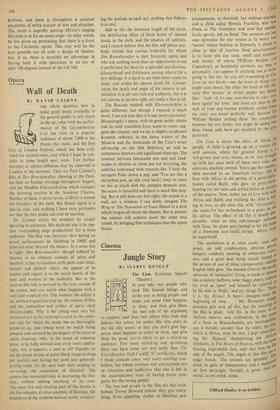Opera
Wall of Death
By DAVID CAIRNS
THE whole question how to make good music available to the general public is vet'y much in the air, what with the perfor- mance of the Glyndebourne Cosi fan nate to a popular audience of about 7,000 at the Proms this week, and the first City of London Festival, which has been criti- cised for exclusiveness. and which I hope to con- sider at some length next week. Two further attempts at culture-diffusion may be observed in London at the moment. They are Paul Czinner's film of Der Rosenkavalier, showing at the Festi- val Hall on Sunday evenings throughout August, and the Mosfilm Khovanshchina which occupies the morning sessions at the Academy Cinema. Neither of these, it seems to me, is likely to extend the frontiers of the faith. But filmed opera is a special case, and nothing I have seen persuades me that the two media can ever be married.
Dr. Czinner solves the problem by simply ignoring its existence. His declared aim is to cap- ture 'outstanding stage productions' for a mass audience. The film was therefore shot during an actual performance (at Salzburg in 1960) and does not stray beyond the theatre. In a sense this is right : Der Rosenkavalier, though inflated by Strauss, is an intimate comedy of salon and boudoir; it has no business with parks and vistas, sunsets and plumed riders; the appeal of its ironies and regrets is to the secret hearts of the men and women in the audience. But in the cinema this link is severed by the iron curtain of the screen, and you watch what happens with a cool and sceptical eye. The moment the action is on, awkward questions pop up; the realism of film and the convention and artifice of opera clash irreconcilably. Why is the young man who lies stretched out on his mistress's couch in the amor- ous toils for which the music has so thoroughly prepared us, and whose wrist we watch being grasped and caressed by the fingers of his lover in erotic close-up---why, in the name of common sense, is he fully dressed and, even more confus- ingly, not, it appears, a man at all? Equally, to see the prima donna at point-blank range arching her nostrils and baring her teeth and generally getting ready for the next note does nothing to encourage the suspension of disbelief. The camera has succeeded only in destroying the illu- sion. without adding anything of its own. The most live and riveting part of the drama is the few minutes, at close quarters, of Karajan, the Napoleon of the modern musical world, conduct- ing the prelude to each act; nothing that follows is so real.
Add to this the immense length of the work, the debilitating effect of three hours of canned music in the dark, and the absence of subtitles, and I cannot believe that the film will please any- body outside that curious fraternity for whom Der Rosenkavalier is their favourite opera and who ask nothing more than an opportunity to see it performed for them by a splendid cast (Jurinac, Schwarzkopf and Edelmann among others) for a few shillings. It is hard to see what more could be done; and within his chosen limits Dr. Czinner varies the depth and angle of his camera to ad- miration. It is all very rich and authentic; but it is not cinema in its own right, not really a film at all.
The Russian method with Khovanshchina is quite different; but though I enjoyed it much more, I am not sure that it is any more successful. Moussorgsky's opera, with its great public theme and its swift transition from scene to scene, sug- gests the cinema; and we see a slightly cardboard Kremlin reflected in the dawn waters of the Moskva and the firebrands of the Czar's army advancing on the Old Believers, as well as sumptuous interiors and significant close-ups. The contrast between fabricated sets and real land- scapes is obvious at times but not worrying, the subtitles (enlivened with remarks like 'I took the arrogant Poles down a peg' and 'You are like a shrivelled pod, an old tired hack') keep us more or less in touch with the complex dynastic plot, the music is beautiful and there is much fine sing- ing. But it still does not feel right; the screen is a wall, not a window. I can dimly imagine The Ring or The Damation of Faust filmed in a style which forgets all about the theatre. But at present the contact will achieve more the other way round, by bringing film techniques into the opera house.






























 Previous page
Previous page